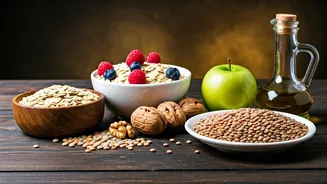Oats: Heart's Ally
Oats, a breakfast staple for many, stand out as a cholesterol-lowering champion. They are rich in soluble fiber, which forms a gel-like substance that
traps cholesterol in the digestive system, preventing its absorption into the bloodstream. Including oats in your diet can significantly reduce LDL (bad) cholesterol levels. The recommended daily intake is about 1.5 cups of cooked oatmeal, which offers a good amount of soluble fiber. Starting your day with a bowl of oatmeal is not only beneficial for heart health but also provides sustained energy throughout the morning. You can enhance the flavor and nutritional value by adding fruits, nuts, or seeds.
Nuts: A Nutritious Choice
Nuts, particularly almonds, walnuts, and cashews, are another excellent addition to a cholesterol-lowering diet. They contain healthy fats, fiber, and plant sterols, all of which contribute to lowering LDL cholesterol. Plant sterols, in particular, block the absorption of cholesterol in the gut. A handful of nuts (approximately 1.5 ounces) daily can provide noticeable benefits. However, it's crucial to consume nuts in moderation due to their calorie density. You can enjoy nuts as a snack, add them to salads, or incorporate them into your breakfast cereal for a boost of flavor and nutrition.
Avocados: Healthy Fats
Avocados are known for their monounsaturated fats, which help reduce LDL cholesterol levels while increasing HDL (good) cholesterol. These creamy fruits are also packed with fiber and plant sterols, adding to their cholesterol-lowering effects. Including avocado in your diet is straightforward; it can be used in salads, sandwiches, or as a dip. A daily serving of half an avocado can offer significant benefits. The versatility of avocados makes them an easy and enjoyable addition to various meals, helping to improve both flavor and nutritional value.
Beans: Fiber Powerhouse
Beans and legumes are exceptionally rich in soluble fiber, making them highly effective in lowering cholesterol. The fiber in beans binds to cholesterol in the digestive tract, preventing its absorption. Incorporating beans into your diet is a simple and cost-effective approach to improving heart health. A variety of beans, such as kidney beans, black beans, and lentils, can be used in soups, stews, or salads. Aim for about one cup of cooked beans daily to reap their benefits. Beans not only help lower cholesterol but also provide a good source of protein and other essential nutrients.
Fatty Fish: Omega-3s
Fatty fish, such as salmon, tuna, and mackerel, are a valuable source of omega-3 fatty acids. Omega-3s can reduce triglycerides, which are another type of fat in the blood. They also help raise HDL cholesterol. Eating fatty fish at least twice a week can significantly improve heart health. Omega-3s help in reducing inflammation, which also benefits overall health. If you are not a fan of fish, consider taking omega-3 supplements to get the same benefits. The dietary changes can result in lower cholesterol levels within three months.












